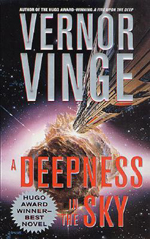 In my previous reaction I described A Fire Upon the Deep as a masterpiece. This is undoubtedly true. If Vernor Vinge had never written another book, A Fire Upon the Deep would have stood as a monumental accomplishment, firmly cementing Vinge’s reputation as one of the best science fiction authors to ever practice the craft.
In my previous reaction I described A Fire Upon the Deep as a masterpiece. This is undoubtedly true. If Vernor Vinge had never written another book, A Fire Upon the Deep would have stood as a monumental accomplishment, firmly cementing Vinge’s reputation as one of the best science fiction authors to ever practice the craft.
So it was even more impressive when A Deepness in the Sky, Vinge’s next book, was even better.
I first read A Fire Upon the Deep and A Deepness in the Sky back in 1999, shortly after A Deepness in the Sky was first published. Reading those two novels for the first time – back-to-back and in such close succession – was a one-two punch which I could only compare to reading, in my much younger days, Asimov’s I, Robot and Foundation Trilogy back-to-back. Or Clarke’s Rendezvous with Rama and Childhood’s End. It would go unmatched until several years later when I was awed by reading Bester’s The Stars My Destination and The Demolished Man for the first time.
Despite the fact that I’d read them before, I still found it hard to accept, as I finished A Fire Upon the Deep, that A Deepness in the Sky was truly as superior as I remembered it to be. But as I picked up the second book, which takes place during an earlier epoch of the Zones universe and serves as a very light prequel of sorts, I discovered to my delight that my memories were not false: Vinge actually managed to ascend even higher on the pinnacle of excellence.
On reflecting on these twin masterpieces, it’s interesting to note that both of them – and Marooned in Realtime immediately before them – feature truly original plots. Looking at Vinge’s earlier works you can find a cornucopia of originality, but the plots are structurally quite familiar: Tatja Grimm’s World is fundamentally a coming of age story. The Witling is fundamentally a great escape story serving as a vehicle for a Campbellian “let’s extrapolate a nifty idea” story. And so forth.
But while you can certainly draw parallels between other stories and various elements of A Fire Upon the Deep and A Deepness in the Sky (the former is hardly the only story to feature “rescue the kids” and “defeat the evil menace”), there are deep structural elements in both stories which are only possible because the unique elements of Vinge’s universe. In A Deepness in the Sky, for example, Pham’s lifelong dream and the faux-Singularity offered to him in the form of the Focused can be crudely compared to an Empire based on slavery, but the fundamental differences make a mockery of the premise.
(All those who find personal joy in stripping out every relevant and meaningful distinction within a story so that you can cram it into half a phrase and then claim that there are only thirty plots or seven plots or one plot in the world can calm down: I know you exist. Your obsession with dogmatizing a mildly interesting intellectual game that can occasionally serve as a useful tool is noted. I pity you in general. Let’s leave it at that.)
Moving beyond the freshness of the plot, I am also struck profoundly by the depth of the plot. Vinge creates an utterly unique setting, populates it with dozens of vividly drawn characters (both human and evocatively alien), and then paints his story on a canvas spread across half a dozen centuries – casting his net far into the past and cascading into the future. And perhaps the most remarkable achievement of it all is that Vinge manages to handle the incredibly complex edifice he has erected with such adroit skill that the reader is never left at a loss.
Once again, the familiar Vingean strengths can be found peppered throughout the story: Villains drawn with vivid and believable detail. Myriad casts of deeply drawn characters brought together through chance and fate to form a tale of epic proportions. Complete and detailed realizations of not only entire societies, but entire societies going through massive upheaval and change.
In fact, re-reading A Deepness in the Sky after reading Vinge’s other works was an interesting experience because I had seen Vinge’s earlier experiments with some of the themes and elements which can be found here: A deeper appreciation of the Singularity served to add greater resonance to the work. The society going through a technological revolution was touched on earlier in Tatja Grimm’s World, but is handled in a completely unique fashion here. And so forth.
I find this reaction has become something of a rambling discourse, and not an entirely satisfying one at that. So I will draw it to a close with these words: If you have not read A Deepness in the Sky, then you have almost certainly missed out on the finest science fiction novel of the past decade.
GRADE: A+











